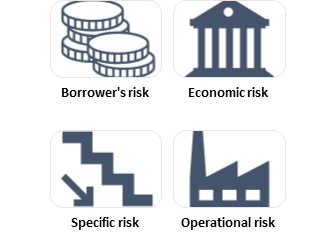What is Financial Risk?
Financial Risk is the risk of losing money on an investment. The investment may be a business venture or a financial asset that holds the potential to generate income.
An enterprise can face various financial risks and many types of dangers that can harm the business or investments, causing capital loss. With financial problems, a company can face resource crunch and hurt cash flow. Customers who fail to pay, vendors delaying the products, or even an unsuccessful business strategy can hurt the businesses financially. Businesses also run the risk of being dented by circumstances outside their control such as the economy, policy, and law changes. Such situations can threaten a company's financial growth and profitability.
Therefore, many enterprises invest money towards financial risk management to secure their business from crashing. With proper risk management, businesses can ensure a fulfilling outcome.
Not just big corporations but governments can also face financial troubles. Poor monetary policy or debt-related issues can create considerable financial burden on governments.
Individuals also face financial trouble that can hamper their income or liquidity crunch.
What are the various types of financial risks?

Image source - © Kalkine Group 2021
- Borrower's risk – commonly known as credit risk. It involves the financial risk associated with oversized debt from loans, credit cards and others. Sometimes, when a company is operating on borrowed money, it could hurt the business if not appropriately managed. Also, too much risk can drive the industry to ruin.
- Economic risk – while doing business in other countries, factors such as macro-and microeconomic can pose a threat. There are various institutions which provide details of the nations around the world and their risk levels. Before expanding the businesses, it is essential to calculate all the risks and opportunities.
- Specific risk – when a select few companies are struggling with issues related to capital structure, financial transactions, it is referred to as specific risks. The term represents the investors’ uncertainty of collecting returns, which can result in monetary loss.
- Operational risk – operational risk is usually based on a company's internal factors. Few companies face this risk because of an unhealthy management and flawed financial structure.
Why Risk Management is important?
Risk management helps the businesses identify the possible risks, analyse them and provide solutions to trim down the losses. Risk management can be especially instrumental while taking investment decisions during uncertain times.
Risk management process is conducted when investors and fund managers analyse the risk level of the investment before making decisions. Based on the results, they can quantify the losses beforehand and take appropriate actions or inactions and hedge the risk. It solely depends on the investors' objectives and risk-taking capacity. More often than not, every business venture and every investment has some level of risk involved.
 CA
CA  AU
AU UK
UK US
US NZ
NZ Please wait processing your request...
Please wait processing your request...